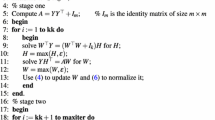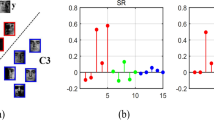Abstract
This paper proposes the Sequential Coordinate-Wise Algorithm (SCWA) to Discriminant Nonnegative Matrix Factorization (DNMF) for improving face recognition. DNMF incorporates Linear Discriminant Analysis (LDA) into NMF using the multiplicative updating rules that are simple in use but usually require many iterations to converge and they do not guarantee the convergence to a stationary point. The SCWA solves the Quadratic Programming (QP) problem by updating only a single variable at each iterative step, which considerably accelerates the convergence for sequentially projected Least Squares (LS) problems that take place in NMF. Moreover, the limit point of the SCWA is the stationary point. The proposed algorithm is tested for supervised face recognition problems where the facial images are taken from the ORL database.
Access this chapter
Tax calculation will be finalised at checkout
Purchases are for personal use only
Preview
Unable to display preview. Download preview PDF.
Similar content being viewed by others
References
Lee, D.D., Seung, H.S.: Learning of the parts of objects by non-negative matrix factorization. Nature 401, 788–791 (1999)
Li, S.Z., Hou, X.W., Zhang, H.J., Cheng, Q.S.: Learning spatially localized, parts-based representation. In: Proceedings of the IEEE Computer Society Conference on Computer Vision and Pattern Recognition (CVPR 2001), vol. 1, pp. I207–I212 (2001)
Guillamet, D., Vitrià, J.: Classifying faces with nonnegative matrix factorization. In: Proc. 5th Catalan Conference for Artificial Intelligence, Castello de la Plana, Spain (2002)
Buciu, I., Nikolaidis, N., Pitas, I.: Nonnegative matrix factorization in polynomial feature space. IEEE Transactions on Neural Networks 19(6), 1090–1100 (2008)
Wang, Y., Jia, Y., Hu, C., Turk, M.: Fisher nonnegative matrix factorization for learning local features. In: Proc. 6th Asian Conf. on Computer Vision, Jeju Island, Korea (2004)
Zafeiriou, S., Tefas, A., Buciu, I., Pitas, I.: Exploiting discriminant information in nonnegative matrix factorization with application to frontal face verification. IEEE Transactions on Neural Networks 17(3), 683–695 (2006)
Lin, C.J.: On the convergence of multiplicative update algorithms for non-negative matrix factorization. IEEE Transactions on Neural Networks 18(6), 1589–1596 (2007)
Cichocki, A., Zdunek, R., Phan, A.H., Amari, S.I.: Nonnegative Matrix and Tensor Factorizations: Applications to Exploratory Multi-way Data Analysis and Blind Source Separation. Wiley and Sons, Chichester (2009)
Kotsia, I., Zafeiriou, S., Pitas, I.: Discriminant non-negative matrix factorization and projected gradients for frontal face verification. In: Schouten, B., Juul, N.C., Drygajlo, A., Tistarelli, M. (eds.) BIOID 2008. LNCS, vol. 5372, pp. 82–90. Springer, Heidelberg (2008)
Franc, V., Hlaváč, V., Navara, M.: Sequential coordinate-wise algorithm for the non-negative least squares problem. In: Gagalowicz, A., Philips, W. (eds.) CAIP 2005. LNCS, vol. 3691, pp. 407–414. Springer, Heidelberg (2005)
Zdunek, R., Cichocki, A.: Fast nonnegative matrix factorization algorithms using projected gradient approaches for large-scale problems. Computational Intelligence and Neuroscience 2008(939567) (2008)
Kim, D., Sra, S., Dhillon, I.S.: Fast Newton-type methods for the least squares nonnegative matrix approximation problem. In: Proc. 6th SIAM International Conference on Data Mining, Minneapolis, Minnesota, USA (2007)
Klaskala, L.: Image recognition with nonnegative matrix factorization. M.Sc. thesis (supervised by Dr. R. Zdunek), Wroclaw University of Technology, Poland (2009) (in Polish)
Author information
Authors and Affiliations
Editor information
Editors and Affiliations
Rights and permissions
Copyright information
© 2010 Springer-Verlag Berlin Heidelberg
About this paper
Cite this paper
Zdunek, R., Cichocki, A. (2010). Sequential Coordinate-Wise DNMF for Face Recognition. In: Rutkowski, L., Scherer, R., Tadeusiewicz, R., Zadeh, L.A., Zurada, J.M. (eds) Artificial Intelligence and Soft Computing. ICAISC 2010. Lecture Notes in Computer Science(), vol 6113. Springer, Berlin, Heidelberg. https://doi.org/10.1007/978-3-642-13208-7_70
Download citation
DOI: https://doi.org/10.1007/978-3-642-13208-7_70
Publisher Name: Springer, Berlin, Heidelberg
Print ISBN: 978-3-642-13207-0
Online ISBN: 978-3-642-13208-7
eBook Packages: Computer ScienceComputer Science (R0)




